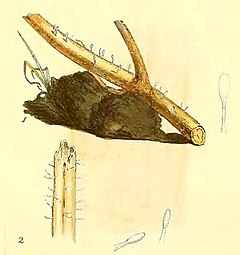Sclerotium (fungus)
| Typhula | |
|---|---|
 |
|
| Typhula quisquiliaris, as illustrated by James Sowerby | |
| Scientific classification | |
| Kingdom: | Fungi |
| Division: | Basidiomycota |
| Class: | Agaricomycetes |
| Order: | Agaricales |
| Family: | Typhulaceae |
| Genus: |
Typhula (Pers.) Fr. |
| Type species | |
|
Typhula phacorrhiza (Reichardt) Fr. |
|
| Species | |
|
Species include: |
|
| Synonyms | |
|
Cnazonaria Corda |
|
Species include:
Cnazonaria Corda
Phacorhiza Pers.
Pistillaria Fr.
Pistillina Quél.
Sclerotium Tode (anamorph)
Typhula is a genus of clavarioid fungi in the order Agaricales. Species of Typhula are saprotrophic, mostly decomposing leaves, twigs, and herbaceous material. Basidiocarps (fruit bodies) are club-shaped or narrowly cylindrical and are simple (not branched), often arising from sclerotia. The anamorphic genus Sclerotium is (in its modern sense) a synonym of Typhula. A few species are facultative plant pathogens, causing a number of commercially important crop and turfgrass diseases.
The genus was first introduced as a section of Clavaria by South African-born mycologist Christiaan Hendrik Persoon in 1801. He differentiated Typhula from Clavaria on the basis of fruitbody shape (Typhula having a distinct head and stem). The name was taken up at generic level by Elias Magnus Fries in 1818. Fries described four species in the genus, including the type species Typhula phacorrhiza. Subsequent authors described another 150 or so species in Typhula.
The genus was revised in 1950 by E. J. H. Corner, who characterized Typhula species as having fruit bodies arising from sclerotia, the genera Pistillaria and Pistillina accommodating similar species lacking sclerotia. A later and more specialist revision by Jacques Berthier (1976) placed both these latter genera in synonymy. No later taxonomic studies have been published, though DNA sequences of the type species have indicated the placement of Typhula within the Agaricales.
...
Wikipedia
